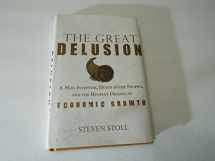
The Great Delusion: A Mad Inventor, Death in the Tropics, and the Utopian Origins of Economic Growth
ISBN-13:
9780809095063
ISBN-10:
0809095068
Edition:
First Edition
Author:
Steven Stoll
Publication date:
2008
Publisher:
Hill and Wang
Format:
Hardcover
224 pages
FREE US shipping
Book details
ISBN-13:
9780809095063
ISBN-10:
0809095068
Edition:
First Edition
Author:
Steven Stoll
Publication date:
2008
Publisher:
Hill and Wang
Format:
Hardcover
224 pages
Summary
The Great Delusion: A Mad Inventor, Death in the Tropics, and the Utopian Origins of Economic Growth (ISBN-13: 9780809095063 and ISBN-10: 0809095068), written by authors
Steven Stoll, was published by Hill and Wang in 2008.
With an overall rating of 4.1 stars, it's a notable title among other
books. You can easily purchase or rent The Great Delusion: A Mad Inventor, Death in the Tropics, and the Utopian Origins of Economic Growth (Hardcover) from BooksRun,
along with many other new and used
books
and textbooks.
And, if you're looking to sell your copy, our current buyback offer is $0.46.
Description
Endless economic growth rests on a belief in the limitless abundance of the natural world. But when did people begin to believe that societies should—even that they must—expand in wealth indefinitely? In The Great Delusion, the historian and storyteller Steven Stoll weaves past and present together through the life of a strange and brooding nineteenth-century German engineer and technological utopian named John Adolphus Etzler, who pursued universal wealth from the inexhaustible forces of nature: wind, water, and sunlight. The Great Delusion neatly demonstratesthat Etzler’s fantasy has become our reality and that we continue to live by some of the same economic assumptions that he embraced. Like Etzler, we assume that the transfer of matter from environments into the economy is not bounded by any condition of those environments and that energy for powering our cars and iPods will always exist. Like Etzler, we think of growth as progress, a turn in the meaning of that word that dates to the moment when a soaring productive capacity fused with older ideas about human destiny. The result is economic growth as we know it, notas measured by the gross domestic product but as the expectation that our society depends on continued physical expansion in order to survive.


We would LOVE it if you could help us and other readers by reviewing the book
Book review

Congratulations! We have received your book review.
{user}
{createdAt}
by {truncated_author}


